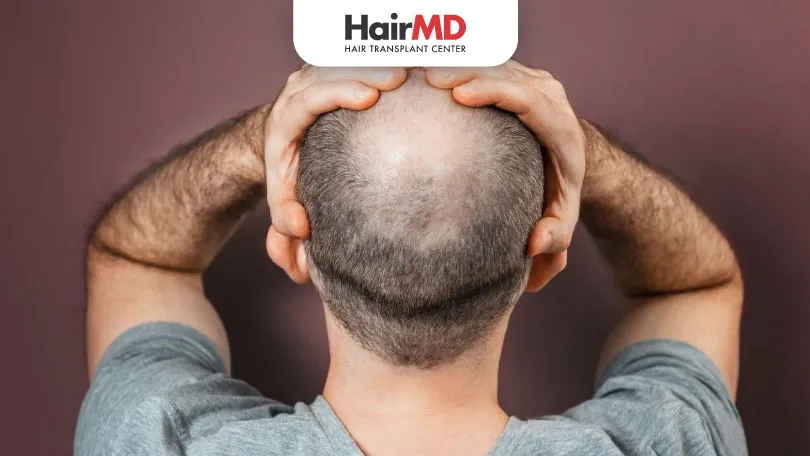15th June, 2022

Are you experiencing sudden hair loss? Well, everyone loses about 50-100 strands per day, and that goes unnoticeable as new hair grows to replace it. If your hairline is receding and hair thinning is getting noticeable, it’s time to check for its underlying cause, which could be because of the medications that you are consuming. Let’s find the connection between metoprolol and hair loss.
Yes, the medication taken for hypertension or high blood pressure and some heart conditions can cause hair loss. With increasing stress from workload, lifestyle diseases including hypertension have become a common problem among the youth. Hypertension is treated using several medications one of which is Beta-adrenoceptor antagonists.
Beta–blocker like metoprolol are often prescribed to treat:
- Hypertension (high blood pressure)
- Angina (chest pain)
- Heart attacks
- Atrial fibrillation
- Other heart problems
Metoprolol associated hair loss may not be a very common side effect of the drug, and it completely depends from person to person
What’s covered in the article?
- How Does Metoprolol Cause Hair Loss?
- How Can This Hair Loss Condition Be Corrected?
- Conclusion
How Does Metoprolol Cause Hair Loss?
Although there is no concrete evidence that metoprolol will cause alopecia, there are chances that some patients may experience hair thinning and patchy hair loss.
Metoprolol may cause hair loss of the telogen effluvium type. Let’s understand what telogen effluvium is and how it affects hair growth.
Telogen is the resting phase of the hair growth cycle. Telogen effluvium is caused when certain stress causes the hair follicles to be pushed prematurely into the resting stage, which is followed by the hair fall stage.
The gravity of the hair loss depends on dosage, body sensitivity, and the hair follicles’ current state.
How Can This Hair Loss Condition Be Corrected?
Once the telogen period is over, the hair starts to regrow slowly. If you are still facing a hair loss problem, you may seek a consultation from a trichologist or hair doctor. Dermatologists and trichologists are experienced in treating balding caused by medication.
For Metoprolol induced hair loss treatment, an expert hair doctor may suggest you-
- Topical therapies like Minoxidil with or without Finasteride
- A topical solution helps in the regrowth of the hair and reduces hair loss.
- Some dietary nutritional supplements can help reduce hair loss, but you must consult your doctors before taking any supplements
- Treatment options
PRP, dermaroller and mesotherapy can help in improving the scalp condition and promote new hair growth.
Some of the dietary supplements that can help in hair regrowth are
- Biotin is vitamin 7, stimulates keratin production in the hair, which facilitates the rate of follicle growth. Egg yolks, whole grain and meat are good sources of Biotin.
- Vitamin B complex helps in producing red blood cells which carries oxygen to the scalp and help hair follicles to generate new hair.
- Vitamin C reduces oxidative stress caused by free radicals and also help create collagen.
- Vitamin E is a powerful antioxidant which fights bacterial and fungal infections on the scalp., VitaminE can be applied to the scalp topically for hair growth. Always consult your doctor for the right dosage.
- Vitamin A modulates the secretion of the right amount of sebum in the scalp, further moisturizes and strengthens the hair follicles.
Medication and treatments depend on the patient’s diagnosis, and one treatment may not fit all. There are many alternative treatments also available to reduce metoprolol-induced hair loss.
If you are experiencing excessive hair loss and looking for a trichologist near you, book a consultation with HairMD’s qualified hair specialists to diagnose your condition and a treatment plan customised for your problem. Our experts will guide you on metoprolol and hair loss.
Do You Know?
Nearly 250 Patients Visit HairMD
Everyday For Various Hair Concerns?
(You are one click away from flawless skin)
Meet Our Dermatologists
Conclusion
The journey through fitness, nutrition, and personal appearance is complex, with whey protein sitting at a crossroads of beneficial and potentially adverse effects.
By fostering a deeper understanding of its impact, individuals can navigate this path with greater awareness and care, ensuring that their pursuit of fitness does not come at the cost of their hair’s well-being. For any more information, feel free to talk to our experts.
Further Reading
Do Hats or Helmets Cause Hair Loss?
Discover the truth about Helmets Cause Hair Loss. Learn how improper helmet use & effective tips to maintain healthy hair with HairMD can affect hair health.
Top Hair Growth Treatments for Women: Your Ultimate Guide
Find effective hair regrowth treatments for women. Explore solutions like PRP, medications, and more to combat hair loss with expert advice from HairMD.
Itchy Scalp and Hair Loss: Causes, Treatments, and Prevention
Itchy scalp and hair loss can be troubling, hinting at deeper scalp and hair health issues. Discover the connection in this comprehensive guide.
Dandruff Fungus Treatment
Learn how dandruff and fungus impact scalp health. With HairMD, you can get expert advice on causes, treatments, and prevention tips to maintain a healthy, flake-free scalp.
Have thoughts? Please let us know
We are committed not only to treating you, but also educating you.











